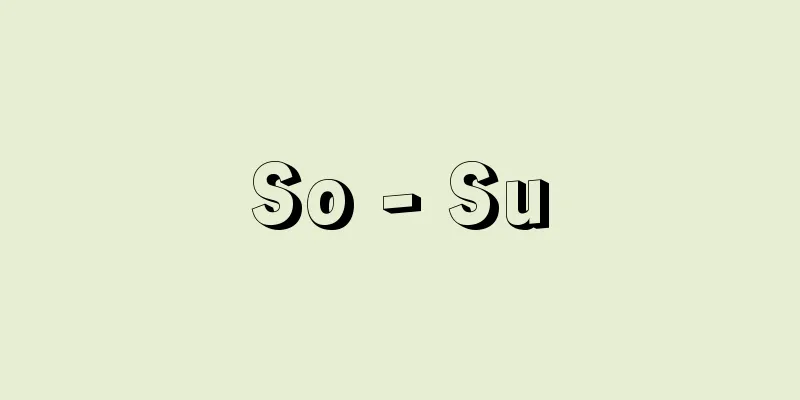So - Su

[1] 〘 noun 〙① Refers to the natural state without any other elements added. To be as it is. It can be used in combination with other words, such as "bare skin," "bare hands," "bare feet," "bare face," and "unglazed pottery." ※Shibukki (1727) "No matter what, there is no decoration or dressing up, so saying "suna mama" is the character for "suna" (unpolished ) ." ※Kabuki・Sanzen Sekai Sho Orai (1772) Kutaku "If I let it out in its natural state, it will be obvious that it will be stepped on." ② A term used in Japanese music. A more informal performance than a formal performance. It refers to playing theatrical music away from the play in a pure concert style, playing Nagauta with musical instruments with only shamisen accompaniment, or singing vocal music with accompaniment without any accompaniment. → Sugotari, Suutai, Suuta. ③ In Japanese dance, dancing without special costumes (funso) , in black family crests and hakama, or in flowing kimono. So-dori. [2] [Prefix] Used before nouns, etc. ① Often attached to words describing people, it adds a derogatory meaning such as ordinary or shabby. "So-machinin" (a townsman) , "So-ronin" (a wandering samurai). *Joruri, Shin Usuyuki Monogatari (1741), part 2 "Are you getting in the way? Get out of there and let me have my fight." ② Adds the meaning that there is only that, that there are no other elements. "So-ichibun" (a single piece of pure), "So-ippon" (a single piece of pure pure), etc. ③ Used before words indicating a state or condition to add emphasis on that state. "So-kanpen" (poor), "So-swift", "So-to-kyo" (a completely blank), etc.So [element]Su [Sou]So-su [source]Source: The Selected Edition of the Japanese Language Dictionary About the Selected Edition of the Japanese Language Dictionary Information |
[1] 〘名〙① 他の要素がつけ加わらない、ありのままのさまをいう。そのままであること。他の語と複合して、「素肌」「素手」「素足」「素顔」「素焼」などと用いることもある。※志不可起(1727)「何によらずかざりつくろひのなきを、すのままなど云、素の字也」※歌舞伎・三千世界商往来(1772)口幕「素(ス)で貸しては、踏まれる事が、みすみす見えてあるわいの」② 邦楽用語。本式の演出に対する略式の演出。芝居用の音楽を芝居から離して純演奏会風に演奏したり、鳴物入りの長唄を三味線だけの伴奏で演奏したり、伴奏入りの声曲を無伴奏でうたったりすること。→素語り・素謡(すうたい)・素唄。③ 日本舞踊で、特別な扮装(ふんそう)をせず、黒の紋付に袴(はかま)、または着流しで踊ること。素踊り。[2] 〘接頭〙 名詞などの上に付けて用いる。① 多く人を表わす語に付いて、平凡である、みすぼらしいなど軽べつの意を添える。「素町人」「素浪人」など。※浄瑠璃・新うすゆき物語(1741)下「す奴め邪魔ひろぐか。そこ退て勝負させい」② ただ、それだけである、他の要素が加わらない意を添える。「素一分」「素一本」など。③ 状態や様子を示す語の上に付けて、そのさまを強調する意を添える。「素寒貧」「素早い」「素頓狂」など。
そ【素】すっ【素】そ‐・す【素】出典 精選版 日本国語大辞典精選版 日本国語大辞典について 情報 |
<<: Nest - Su (English spelling)
Recommend
reasonable expectation
…D. Hume and A. Smith are representative of this ...
Gloss - En
[noun/adjective] 1. Something that is gorgeous and...
Kamioda (Hyogo)
...The JR Bantan Line runs along Ichikawa, and th...
Rostov (English spelling)
A city in the Rostov Oblast in the southwest of th...
Empty arm - Soraude
The title of a Kyogen piece. Tarokaja Kyogen. At ...
Linear surface - Linear surface
A surface described by the motion of a line with ...
Sweet Kudzu Fried - Sweet Kudzu Spiral
〘Noun〙① = Azura (sweet kudzu) ① ※Shosoin documents...
History of painting in Japan
This is the first full-scale art treatise and his...
Jeong Cheol
1536‐93 A Korean civil servant and poet in the mid...
Goldfish (kingyo) - Goldfish (English spelling)
It is a breed of crucian carp (family Cyprinidae) ...
stretch-expand forming
…The simplest method is bending. The method of ma...
Theory of human nature - Seiakusetsu
This is the theory of Xunzi, a Chinese thinker fr...
Astrographic Catalogue
...The spectral types are also listed. The Carte ...
Yanagida Izumi
Japanese literature scholar and translator. Born ...
Resident foreign currency deposit general account - Resident foreign currency deposit general account
…After the Second World War, in Japan, residents ...









